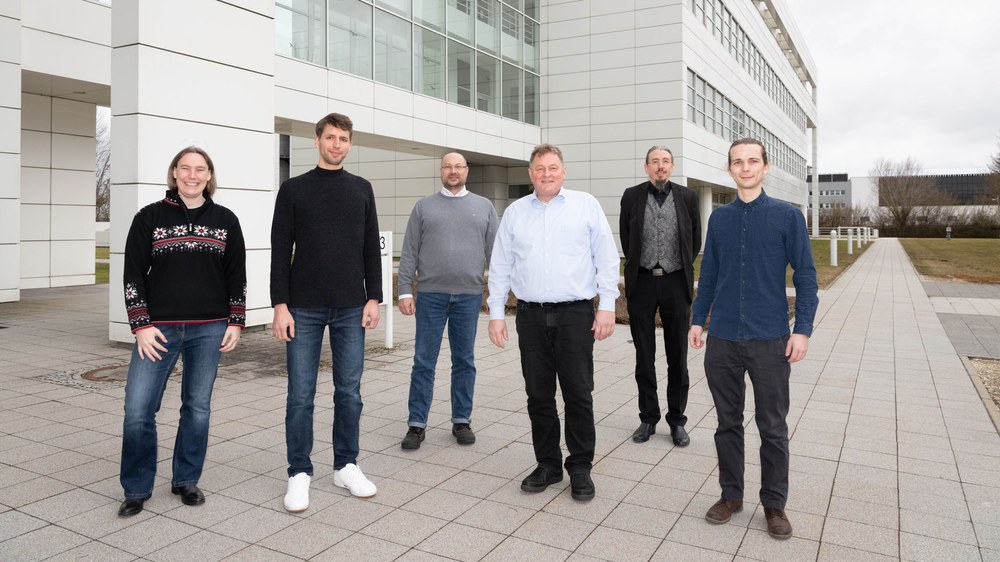How analogue computers support quantum computing



anabrid GmbH
- In hybrid systems, commonalities between analogue computers and quantum computers can be explored in their interaction with conventional high-performance computers.
- The coupling of different computer architectures is the subject of further developments.
- The company anabrid GmbH is moving into the DLR Innovation Center in Ulm.
- Focus: Quantum computing, digitalisation, High Performance Computing (HPC)
In the 1960s, computers looked like cupboard-sized grey boxes, with control panels full of knobs, switches and colourful cables. These were the analogue computers that were replaced by digital computers in the 1980s. Now, analogue computers are helping to develop hybrid systems for Quantum computers. One project of the Quantum Computing Initiative at the German Aerospace Center (Deutsches Zentrum für Luft- und Raumfahrt; DLR) involves building an analogue computer. DLR has now awarded its first contract for a project in this field.
How do these supposedly outdated computers fit in with future-oriented quantum computers? "Analogue computers, like quantum computers, fall into the category of 'unconventional computing'. They are similar in that a physical system – in this case usually an electronic circuit – is used directly as a model to solve a problem, with variables being read out in a measurement-based way," explains Robert Axmann, Head of the Quantum Computing Initiative. “For this reason, it is likely that analogue computers can also be coupled more directly with quantum computers than, for example, conventional stored-program computers."
In addition, both quantum computers and analogue computers can work with conventional high-performance computers within hybrid systems. Both require research work that is complementary. A hybrid system outsources only selected problems to a quantum computer or an analogue computer. Further processing is done by a conventional computer. In this way, the advantages of both technologies are combined. The development of hybrid computer architectures is one of the key areas being addressed by the Quantum Computing Initiative.
Computer available to working groups and DLR institutes
Over the next four years, the company anabrid GmbH will be building an analogue computer on behalf of DLR and providing software that defines the sequence of computing steps. This will enable rapid reprogramming of the analogue computer to solve very different problems. Analogue computers are characterised by the fact that they solve tasks through a fixed sequence of physical processes. In the past, the components for different tasks had to be rewired by hand. This is now done by the software. Analogue computers are considered particularly fast and energy efficient. This aspect is also being researched by the project team.
This modern analogue computer will also be available for use as a research computer by other working groups in the Quantum Computing Initiative. In addition, DLR institutes will be able to use it for special computing operations in hybrid systems. "Applications are conceivable, for example, in molecular physics, in the simulation of quantum systems, in materials physics or the optimisation of logistics. These are some of the fields in which we generally also see quantum computers," says Axmann.
Matthias Zimmermann from the DLR Institute of Quantum Technologies in Ulm on possible collaborations: "At our Institute, we are examining specific possible applications of the analogue computer, for example for the simulation of quantum matter, in order to further develop existing quantum technologies. However, a better understanding of how conventional analogue computers work could also lead to completely new, unconventional approaches in the field of quantum computing, which we would like to transfer into applications."
anabrid GmbH and its employees also use premises at the DLR Innovation Center in Ulm. The close proximity to DLR institutes and companies involved in the DLR Quantum Computing Initiative creates synergies. DLR has already published several calls for proposals for the Quantum Computing Initiative.
The DLR Quantum Computing Initiative
Within the framework of the Quantum Computing Initiative, prototype quantum computers with different architectures will be built within the next four years, and the associated technologies and applications will be developed. DLR is involving companies, start-ups and other research institutions to jointly drive forward the development work on hardware, software and applications for quantum computers.
DLR has received funding for this from the Federal Ministry for Economic Affairs and Climate Action (Bundesministerium für Wirtschaft und Klimaschutz; BMWK). DLR is awarding contracts to companies on a significant scale, including through a number of competitive tendering processes. DLR is contributing its own expertise to the research and development work and is focusing on the transfer of this to industry.
anabrid GmbH
The deep-tech start-up anabrid GmbH has been developing modern analogue and hybrid computers since 2020. The founders have decades of experience in analogue computing, circuit design, IC design and in industrial application areas. The company's medium-term goal is to develop a highly integrated analogue computer on a microchip that can be used as a coprocessor in industry and research.
Related News
- Call for proposals to construct photonic quantum processors
- Call for proposals to design quantum processors based on ion trap technology
- Qubits hit the ground running
- Quantum Computing Exchange Forum strengthens cooperation
- More accurate than ever – new clocks for future satellite navigation
- Concepts for the development of German quantum computers
- DLR teams up with industry to develop German quantum computers
- DLR opens the Institute of Quantum Technologies in Ulm
